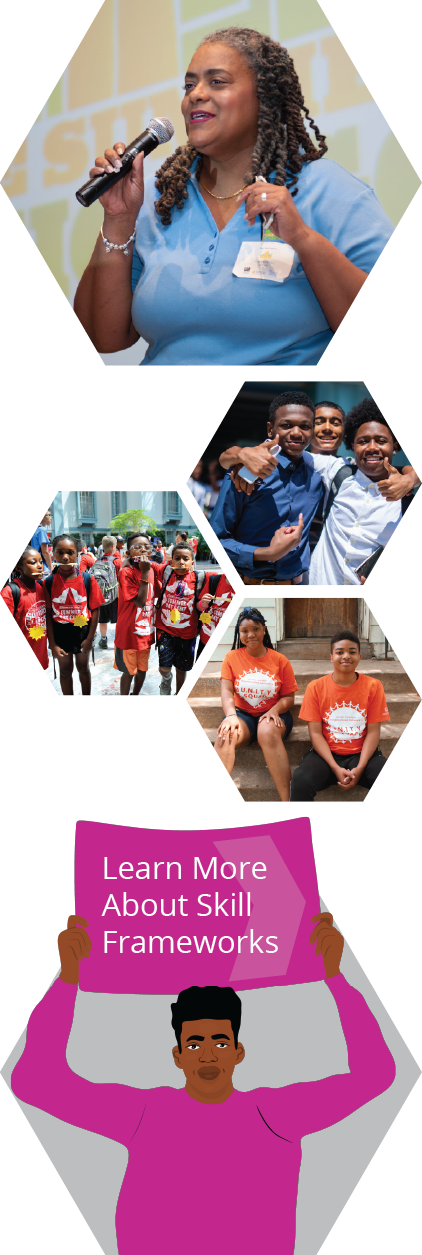About Us
MHA Mission ~ Embracing Strengths
MHA Labs is the manifestation of a grassroots community dedicated to developing and celebrating the 21st century skills of youth and young adults. 21st century skills are the essential foundation for human development and fuel personal agency, positive relationships, career success, and community power.
We focus on developing and sharing practical, engaging, high impact skill building resources with our community. In our founding years, we engaged 1000’s of educators, after-school instructors and workforce developers to innovate at the scale and diversity needed to turn promising practices into system solutions. Every tool and resource has been co-developed by a practitioner and tested in real world conditions with diverse teens of all ages.
Asset-Based Human Development and Aspirations
Young people have a right to aspire along a path of their own making. MHA Labs skill building focuses on equitable, asset-based human development not human capital. The dreams, goals, and aspirations of Black, Brown, and Indigenous youth and communities have been marginalized by racism and economic exploitation for far too long.
Collective Impact and Mutual Respect
All stakeholders, including youth, peers, parents, caregivers, educators, after school instructors, community members, employers, researchers, and policy makers share a responsibility to foster skills development. MHA Labs stakeholder engagement focuses on mutual respect. The voices of Black, Brown, and Indigenous stakeholders of all ages have been marginalized by racism and academic white privilege for far too long.
Systemic Racism and Anti-Discrimination
Young people are growing up in a society framed by systemic racism where hard work and skills are filtered through a lens of white supremacy. MHA Labs advocates for the inclusion of anti-discrimination practices and policies in all of its partnerships. Black, Brown and Indigenous youth have been pathologized as “not good enough” for far too long.
Our Founders ~ Creating Community
MHA Labs would like to recognize and celebrate the community of co-founders who stewarded MHA into a national movement of skill builders. Your unwavering commitment brought our shared vision to life. Your insights pushed us to innovate. Your care and patience created a safe space to grow. Your creativity built a system of resources that empowered thousands of peers. Your passion for teen power, agency, confidence, and opportunity was truly inspiring. We will forever love our MHA Family.
Leslie Beller, Founder and CEO
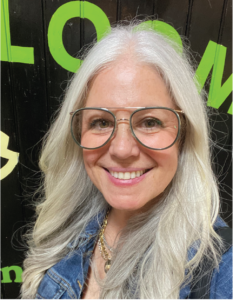 Leslie Beller is a long-time advocate for youth and collective impact operating as both entrepreneur and public sector administrator to create sustainable college, career and life pathways. Over the last five years, Leslie steadfastly stewarded the MHA Labs initiative from its start as a one-page rubric, through a rapid development W.K. Kellogg innovation venture, into a successful independent cradle to career skills organization with 1000’s of users. Practicing what she preaches, Leslie often uses the MHA Labs skills framework to guide her through the complexity of managing a national skills reform movement.
Leslie Beller is a long-time advocate for youth and collective impact operating as both entrepreneur and public sector administrator to create sustainable college, career and life pathways. Over the last five years, Leslie steadfastly stewarded the MHA Labs initiative from its start as a one-page rubric, through a rapid development W.K. Kellogg innovation venture, into a successful independent cradle to career skills organization with 1000’s of users. Practicing what she preaches, Leslie often uses the MHA Labs skills framework to guide her through the complexity of managing a national skills reform movement.
Prior to launching MHA Labs, Leslie was the Program Director for Youth Initiatives at the Chicago Cook Workforce Partnership (formerly Chicago Workforce Investment Council) where she championed citywide college and career readiness initiatives. Before coming to The Partnership, Leslie spent two years working on diversity and equity issues at the University of Virginia to broaden her knowledge base to include college readiness and access. She is co-founder and former President of i.c.stars, a technology leadership development program that uses simulation-based education to address over 300 technical, business and leadership standards necessary to succeed in a rapidly shifting economic environment. Before pursuing the i.c.stars entrepreneurial approach, she served as a Director at Jobs for Youth, a large-scale youth workforce development agency targeting disconnected young adults. In her spare time you will often find Leslie spending even more time with youth working on topics that inspire her including civic education, social justice, and user-centered design.
MHA Labs would like to recognize two leading board members who were vital in stewarding the organization. Thank you Adrienne Scherenzel, Vice President, Chicago Bulls Community Engagement and Cate Swinburn, Co-founder, President & CEO of YouthForce NOLA.
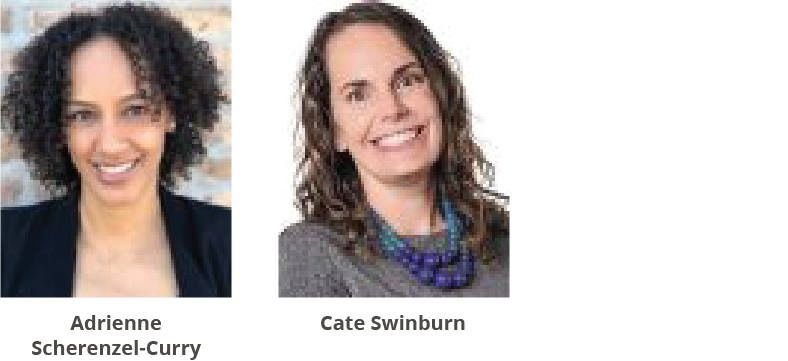
MHA would like to recognize three champions who founded MHA Labs communities in their Cities.
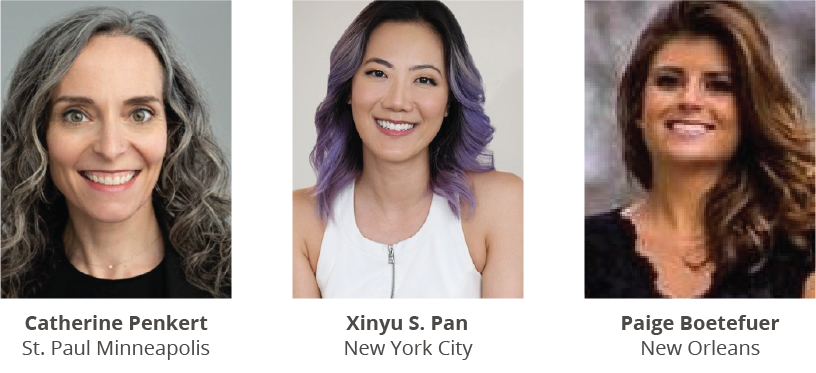
Founding Contributors
Trinanein Almo, After School Matters
Jennifer Axelrod, Chicago Department of Family and Support Services
George Aye, Greater Good Studio
Sara Aye, Greater Good Studio
Alison Barker, Cowen Institute at Tulane University
Natalie Bianchi, Bark Design
John Bistolfo, Bark Design
Gene Block, Chicago Public Schools
Paige Boetefuer, YouthForce NOLA
Jason Brown, Project Success
Ebony Campbell, Chicago Housing Authority
Ted Christians, Umoja Student Development Corporation
Adar Cohen, Civic Leadership Foundation
Lisa Davis, Chicago Department of Family and Support Services
Joyce Deborah-Sheppard, Umoja Student Development Corporation
Aarti Dhupelia, Chicago Public Schools
Sydney Doyle, unCommon Construction
Melissa Ehlinger, YouthForce NOLA
Camille Farrington, University of Chicago
Marsha Figaro, Chicago Public Schools
Wendy Fine, Youth Guidance
Aaron Frumin, unCommon Construction
Rahmel Fuller, YouthForce NOLA
Nikki Hale, Coaching Leaders
Deonna Hart, Youth Development Expert
Lucas Havens, Genesys Works Twin Cities
Thomas Hobart, Chicago Public Schools
Marianna Jennings, Chicago Public Schools
Gwyn Joliff-Blake, Chicago Public Schools
Nicole Jolly, Cowen Institute at Tulane University
Edwin Lee, Greater Good Studio
Ivan Lui, Brooklyn Bridge Alliance for Youth
Nathan Magel, Columbia Graduate School
Amy Mart, Chicago Public Schools
Miriam Martinez, Mikva Challenge
Melinda “Bob” Maureen, Coaching Leaders
Gina McGovern, David. P Weikart Center for Youth Program Quality
Sarah Mercado, Youth Guidance
Tara Myers, American Institutes for Research
Jenny Nagoaka, University of Chicago
Emily Nott, After School Matters
Xinyu S. Pan, New York City Public Schools Skills Lab
Catherine Penkert, Saint Paul Parks and Recreation
Anna Peterson, AchieveMPLS
Joseph Pinto, New York City Public Schools Skills Lab
Tania Rempert, University of Illinois
Lindsey Richland, University of Chicago
Jonathan Rosa, University of Massachusetts
Jamie Roth, SGA Youth and Family Services
Shaun Rowe, Bark Design
Eugene Robinson Jr., Chicago Public Schools
Vikki Rompala, Metropolitan Family Services
Lindrea Ross, Project Osmosis
Sarah Rudofsky, Chicago Public Schools
Michelle Russell, Montclair Public Schools
Luis Salado-Herrera, Brooklyn Bridge Alliance for Youth
Parv Santhosh-Kumar, Office of the Mayor, City of Chicago
Ken Simon, Formerly Minneapolis Public Schools
Jon Skaggs, Bark Design
Caycee Sledge, Chicago Public Schools
Leslie Stein, Youth Guidance
Nathan Stockman, YouthForce NOLA
Aubrie Tossman, Umoja Student Development Corporation
Bernie Trilling, Author
Karen Van Ausdal, Chicago Public Schools
Carlos Vera, Chicago Public Schools
Erin Walach, Chicago Public Schools
Steve Weaver, After School Matters
Jill Young, After School Matters
Founding Collective Impact City Partners
Chicago Lead Partners
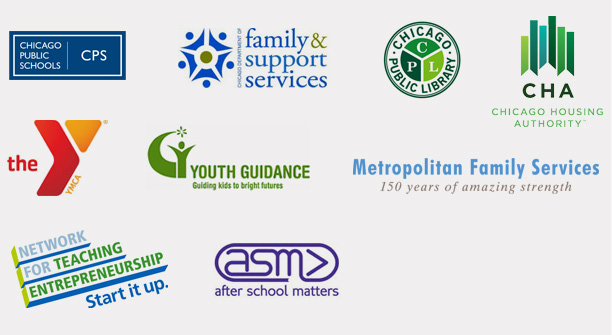
Twin Cities Lead Partners

New Orleans Lead Partners

Our Story ~ Scaling Skills
MHA Labs began as a prototype work-based learning assessment and in just three years was transformed into an innovation lab and national grassroots movement celebrating the skills of youth and young adults. At each phase of scale, MHA’s team and stakeholders worked rigorously to ensure that every design was engaging, ethical, and evidence based.
Due to this high visibility pilot, within the first year, Leslie Beller fielded adoption requests from Chicago largest youth serving organizations including After School Matters, the Chicago Department of Family and Support Services, the Chicago Park District, and the Chicago Housing Authority. These organizations became early adopters of the Employability Assessment. Based on this immediate scaled traction, Leslie Beller was asked to serve on a variety of college and career readiness committees at the city, state and national level further showcasing the work.
In 2012, the Employability Assessment was selected by the W.K. Kellogg Foundation as a key innovation for the The New Option Project, a national innovation lab dedicated to increasing access to employment for marginalized teens. The goal was to build a system of tools and trainings based on the initial success of the Employability Assessment.
To drive reinvention, early adopter partners were invited to become co-creators and co-founders of a new initiative that sought to expand the Employability Assessment to a broader youth development system. To begin, Beller developed a more comprehensive dataset of over 21,000 cradle to career essential skill competencies. Then she activated a wide range of stakeholders including youth, parents, caregivers, educators, after school instructors, community members, employers, evaluators, researchers, and policy makers. Over the course of a year the community collaborated, discussed and debated the merits of all potential skills and collectively agreed to the 35 skills that would become the MHA Building Blocks. This strategy was intentionally used to mitigate future adoption complications typical to top-down reforms which polarize institutions against front-line educators and youth developers. By establishing all of our potential users (and detractors) as partners, we had 100% adoption upon the beta release of the tools.
In just three years, this prototype was transformed into a skills innovation lab and national grassroots movement celebrating the essential skills of youth and young adults. All of MHA Labs founding partners have sustained their commitment to skill building for over a decade.
Our Approach: Multiplying Impact
MHA Labs pursued an approach to skill building that was most realistic and equitable.
21st Century Skills development requires continuous skills practice across different contexts and settings. We pursue this by incrementally adding skills development across all aspects of daily life. This radically increases the number of skill building experiences. For example, when every teacher in a school adds just one collaborative activity a year, youth experience a multiplier effect of up to 8 collaborative skill-building experiences. When a large internship program asks supervisors to give regular skills feedback, 1000’s of youth begin to learn on the job. When a parent or caregiver closes each day with a positive skills affirmation, youth get 365 days of confidence boosting.
This strategy is called Radical Incrementalism. This occurs when large numbers of stakeholders change incrementally to produce radical systems level impact. Compared to isolated, expensive interventions that limit impact to a small number of youth. MHA Labs blend of community organizing with systems engineering may provide a new, more realistic, model for transforming youth outcomes.
Our Data: Cataloging Chaos
In 2011, MHA Labs built a 21st century skills database of over 21,000 skill competencies from 100’s competency frameworks, assessments and research reports. 21st century skills is a domain term for all social emotional skills, soft skills, essential skills, leadership skills, life skills, career readiness skills, and college readiness skills. Each of these sources included academic research findings as well as survey data from 1000’s of practitioners in education, after school, and employment.
After our first phase of framework development, the MHA Labs community deployed 1000’s of youth, instructor, and supervisor surveys to measure impact and skills performance. Using this data, MHA Labs researchers were able to isolate the core Hirability Skills that are critical for High School/Teen internship readiness. This allowed us to make data driven decisions over which skills were chosen, often challenging established norms.
Read more about how this database was transformed into two leading essential skill frameworks in the Skill Frameworks Section.
Read the key reports that started the MHA Labs 21st century skills movement:
MHA Labs created infographics to accompany the original reports to increase accessibility.
Lifespan Development Milestones Infographic
University of Chicago Consortium on School Research – Teaching Adolescents To Become Learners
Infographic for Teaching Adolescents To Become Learners
National Research Council – Education for Work and Life
Infographic for Education for Work and Life
Conference Board – Are They Really Ready to Work Infographic for Are They Really Ready to Work

